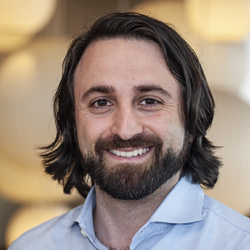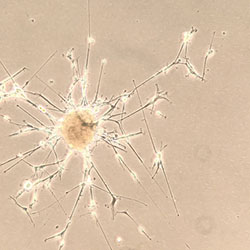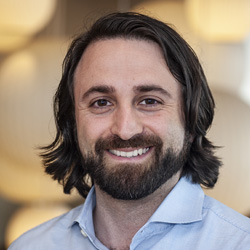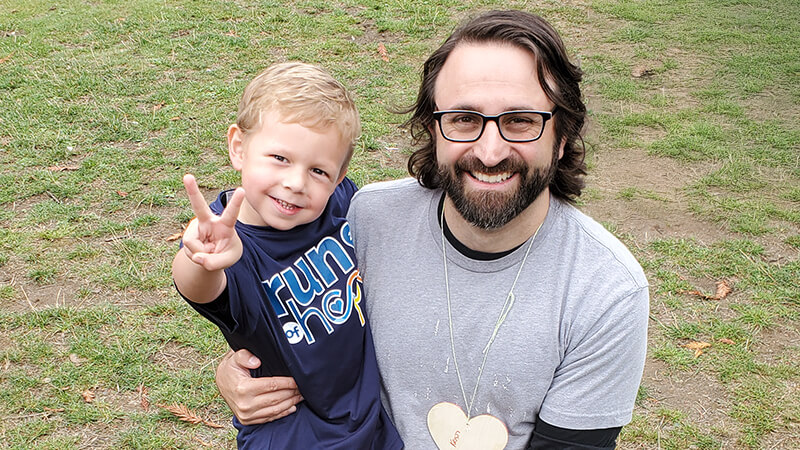Nicholas A Vitanza, MD

Specialties
- Children's Title: Attending Pediatric Neuro-Oncologist, Cancer and Blood Disorders Center
- Academic Title: Associate Professor, Hematology/Oncology
- Research Title: Principal Investigator, Ben Towne Center for Childhood Cancer and Blood Disorders Research
- Research Center: Ben Towne Center for Childhood Cancer and Blood Disorders Research
- On Staff Since: August 2016
"My goal is to find safer and more effective therapies for children with central nervous system (CNS) tumors (meaning, tumors of the brain and spine). As a pediatric neuro-oncologist, translational scientist, Scientific Director of the Brain Tumor Research Program, and the CAR T cell Lead, I am fortunate to span the intersection where laboratory science translates into new clinical trials. Our work has helped advance epigenetically-targeted drugs and targeted immunotherapies – such as CAR T cells – to the clinic for patients with fatal tumors such as diffuse intrinsic pontine glioma (DIPG), diffuse midline glioma (DMG), and atypical teratoid rhabdoid tumor (ATRT). Overseeing our multiple open CNS CAR T cell trials has allowed me to connect with in need families from all over the world and our pledge is to provide expert, compassionate care to each child we meet."
-
Biography
Dr. Nicholas Vitanza is a pediatric neuro-oncologist and translational scientist whose career is dedicated to the care of children with fatal brain and spinal cord tumors, particularly diffuse intrinsic pontine glioma (DIPG), diffuse midline glioma H3K27M-altered (DMG), and atypical teratoid rhabdoid tumor (ATRT). During his pediatric oncology fellowship with Drs. Bill Carroll and Elizabeth Raetz at New York University, his laboratory projects led to a COG clinical trial and an ASPHO award. Next, he completed another fellowship in pediatric neuro-oncology at Stanford University and a post-doc in Michelle Monje’s neuroscience/DIPG Lab, in which he performed high-throughput drug screens in patient-derived DIPG models and mechanistic analyses of epigenetic vulnerabilities in DIPG. This work led to publications in Cancer Cell and Science Translational Medicine, as well as a phase 1 clinical trial.
In 2016, Dr. Vitanza joined the faculty at Seattle Children’s Hospital and directs the Vitanza Lab, focused on creating treatment-naïve biopsy-derived patient-derived DIPG/DMG models, discovering targetable molecular and immunologic vulnerabilities in these tumors, and translating these findings into innovative new clinical trials. Dr. Vitanza is an NIH-funded scientist who serves as the Scientific Director of the Brain Tumor Research Program, overseeing a dedicated research program spanning laboratory work to patient care, and CNS CAR T Cell Lead, overseeing CAR T cell trials for brain and spinal cord tumor patients. He has written and directed multiple CNS CAR T cell clinical trials including BrainChild-01 (targeting HER2), BrainChild-02 (targeted EGFR), BrainChild-03 (targeting B7-H3), and BrainChild-04 (multi-antigen targeting of HER, EGFR, B7-H3, and IL-13ra2).
Dr. Vitanza's translational research has been published in multiple leading journals, including Cancer Cell, Cancer Discovery, Nature Medicine, and Neuro-Oncology. He has shared his work at a range of national and international conferences and was honored to be an invited researcher to the Cancer Moonshot Brain Tumor Forum at the White House in 2023.
Ultimately, his goal is to better understand vulnerabilities in DIPG, DMG, and ATRT; translate those scientific discoveries into improved outcomes for affected children; and ultimately cure the remaining incurable CNS tumors of childhood.
Board Certification(s)
Pediatrics
Pediatric Hematology-Oncology
Education
American University of the Caribbean School of Medicine, Cupecoy
New York University, New York, New YorkResidency
State University of New York at Stony Brook, Stony Brook, NY
Fellowship
Lucile Salter Packard Children's Hospital-Stanford, Palo Alto, CA
New York University Langone Medical Center, New York, NY
NYU Langone Hospital, New York, NY
Stanford University School of Medicine, Stanford, CAClinical Interests
Brain and spinal cord tumors of childhood; diffuse intrinsic pontine glioma (DIPG); diffuse midline glioma (DMG); CAR T cell immunotherapy; early phase clinical trials
Research Description
My laboratory research focuses on developing new, targeted drugs and CAR T cell therapies against pediatric brain and spinal cord tumors, particularly diffuse intrinsic pontine glioma (DIPG), diffuse midline glioma (DMG), and atypical teratoid rhabdoid tumor (ATRT).
Research Focus Area
DIPG, DMG, ATRT, CAR T cell therapy, epigenetics, early phase clinical trials
-
Related Resources
-
Diffuse Intrinsic Pontine Glioma Research Program
Diffuse intrinsic pontine glioma (DIPG) and diffuse midline gliomas (DMG) are aggressive childhood cancers. The DIPG Research Program at Seattle Children’s focuses on development of new therapies for aggressive brain and central nervous system tumors through optimization of clinical care.
-
Nicholas A Vitanza, MD Researcher Profile
View the Seattle Children's Research Institute profile of Nicholas A Vitanza, MD including their publications and grants.
-
The Vitanza lab searches for new treatments that are both safe and curative for aggressive pediatric brain and spinal cord tumors, such as diffuse intrinsic pontine glioma (DIPG), diffuse midline glioma H3 K27M-mutant (DMG), and atypical teratoid rhabdoid tumor (ATRT).
-
NBC News Features Seattle Children's Brain Cancer CAR T Cell Research
Encouraging findings from Dr. Nick Vitanza show success dosing cell therapy directly to brains of patients with DIPG.
-
Seattle Children’s Study Finds CAR T Cells Safe, ‘Encouraging’ for Fighting Lethal Brain Cancer
Encouraging success from Seattle Children’s cancer doctor and researcher Nick Vitanza dosing CAR T cell therapy directly to brain for patients with DIPG.
-
-
Patient Testimonials
-
Awards and Honors
Loading...Award Name Award Description Awarded By Award Date {{ award.name }} {{ award.description }} {{ award.organization }} {{ award.displayDate }} No Awards and Honors found for Nicholas A Vitanza, MD
-
Publications
Loading...No Publications found for Nicholas A Vitanza, MD
-
Presentations
Loading...Presentation Title Event Location Date {{ presentation.title }} {{ presentation.presentedAt }} {{ presentation.location }} {{ presentation.displayDate }} No Presentations found for Nicholas A Vitanza, MD
-
Research Funding
Loading...Grant Title Grantor Amount Award Date {{ funding.title }} {{ funding.grantedBy }} {{ funding.amount }} {{ funding.displayDate }} No Research Funding found for Nicholas A Vitanza, MD
-
Clinical Trials and Research Studies
Loading...{{ item.st }}
No clinical trials found for Nicholas A Vitanza, MD.


